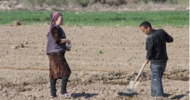The 2-minute animation 'There You Go!' shows how 'development' can rob self-sufficient tribal people of their land, livelihood and pride, and turn them into beggars.
- Survival International
-
03 February 2014
On January 22 a comprehensive database on land and resource governance programmes funded by members of the Global Donor Working Group on Land will be presented during the AGA in Paris.
- Donor Platform
-
16 January 2014
Everywhere in Africa the story is more or less the same: communal rights are being grossly interfered with, farming systems upturned, livelihoods decimated, and water use and environments changed in ways which are dubiously sustainable.
- Wealth of the Commons
-
09 May 2013
The most recent U.N. demographic projections show world population growing to 9.3 billion by 2050, an addition of 2.3 billion people. Most people think these demographic projections, like most of those made over the last half-century, will in fact materialize. But this is unlikely, given the difficulties in expanding the food supply, such as those posed by spreading water shortages and global warming. We are fast outgrowing the earth’s capacity to sustain our increasing numbers.
Foreign investment in African land has been greatly fostered by the Indian Government and its business associations.
- Hindu Business Line
-
06 May 2013
Ethiopians stormed the 17th Street Office complex of the World Bank in Washington DC, protesting the bank’s alleged support for land grab and ethnic cleansing by President Girma Wolde-Giorgis
- Daily Independent
-
23 April 2013
The 612 Indians on the list of those who have invested in tax havens such as the British Virgin Islands include two MPs, a former royal, top industrialists and the CEO of Karuturi Global.
Reading between the lines, the Durban BRICS resolutions will support favoured corporations' extraction and land-grab strategies and confirm the financing of both African land-grabbing and the extension of neo-colonial infrastructure through a new 'BRICS Bank'
Thousands of Ethiopians are being driven off their ancestral land that the government's selling without their consent to foreign investors buying up vast swathes of farmland, a U.S. watchdog reports.
Rulli and colleagues estimate that global land grabbing is associated with the grabbing of 308 billion m3 of green water (i.e. rain water) and an additional grabbing of blue water that can range from 11 billion m3 (current irrigation practices) to 146 billion m3 (maximal irrigation) per year. To put these numbers in perspective, the average daily household consumption of water in the UK is 150 liters (0.15 m3) per person.
- 3quarksdaily
-
07 January 2013
Major farmland investors such as banks and pension funds must stop facilitating land grabs, civil society groups on the eve of a global farmland investment conference in London on December 3-5, have said.
- AkanimoReports
-
30 November 2012
Former Nigerian president Obasanjo calls on African Union to develop a framework for managing foreign investment in agriculture, and says governments should consider a moratorium on large-scale land deals pending legislation to protect smallholder farmers.
Only legal recognition of commons as the communal property of communities is sufficient to afford real protection, writes Liz Alden Wily
- Wealth of the Commons
-
23 October 2012
Researchers find that bulk of deals to lease out land are struck in 32 of the countries ranked “alarming” or “serious” on the Global Hunger Index score.
African Development Bank (AfDB) country director, Freddie Kwesiga, said the co-operating partners look forward to specific interventions to ensure improved land tenure and equitable access to land by partnerships of small, medium and large-scale investors.
- Daily Mail
-
07 August 2012
GRAIN looks behind the current scramble for land in Africa to reveal a global struggle for what is increasingly seen as a commodity more precious than gold or oil - water.
Dr Fahd bin Abdulrahman Balghunaim, minister for agriculture for the Kingdom of Saudi Arabia, speaks to This is Africa about the government's strategy in Africa.
- This is Africa
-
08 June 2012
The distinctive feature of these land deals that has attracted attention is the speed of the acquisitions, the transparency (lack thereof) of the terms and the scale of the acquisitions and implied investment.
The science and environment author discusses a growing global threat
Sixty years on, controversial agricultural projects are back in fashion in Africa and other parts of the developing world as investors - from foreign governments to wealthy individuals - hunt for land to grow food.
"During my research trips in Africa, I came across posters against the land grab deals," Liberti told IPS. "One said: ‘Future generations will damn your graves, because you did not leave them any land.’"
Una petizione al presidente Obama. In attesa che anche l’UE faccia qualcosa
- Il Fatto Alimentare
-
08 February 2012
Sai Ramakrishna Karuturi talks to the Times of India about his African safari.
- Times of India
-
01 January 2012
Governments and companies involved in leasing land claim it is little used and that the projects will bring food security, create jobs and boost tax revenues – none of which is true
The Ethiopian Ministry of Agriculture plans to conduct a media tour accompanied by officials next week in Gambela to increase public awareness surrounding land grabbing issues.
While certain provisions in contracts can contain sensitive commercial information that may require a level of confidentiality, it does not justify keeping all information about large-scale agricultural projects outside the public domain.
This 2011 trapca Trade Conference will be held in Arusha, Tanzania, on 24-25 November 2011
Pambazuka News spoke to Anuradha Mittal, Jeff Furman and Frederic Mousseau about what prompted their research on large-scale investments in land in Africa and what they discovered.
From the Middle East to Madagascar, high prices are spawning land grabs and ousting dictators. Welcome to the 21st-century food wars.
- Foreign Policy
-
27 April 2011
As Gulf states continue to invest in foreign farmland, what are the long term implications
- Arabian Business
-
13 January 2011















